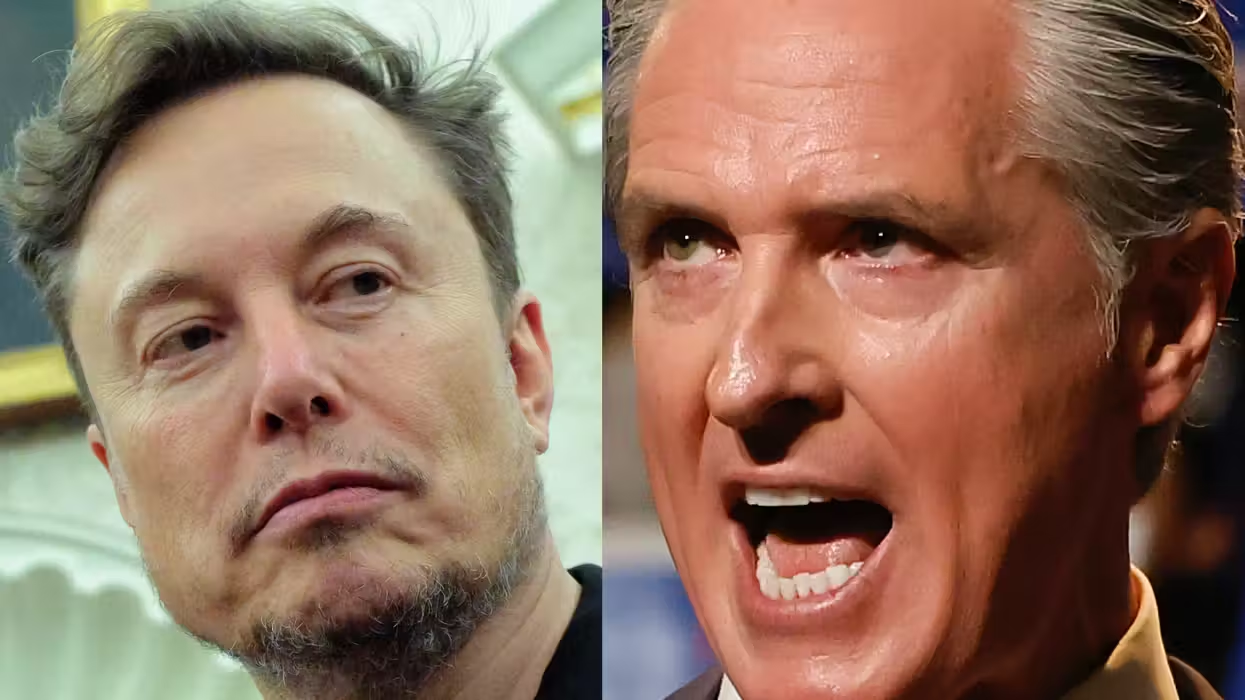Russia and China are getting cozier, and it could spell bad news for the West.
Bloomberg reported Monday that the two powers had signed a second energy deal, one that was nearly as large as the $400 billion deal Russia and China reached earlier this year.
The accord came as President Barack Obama arrived in Beijing for the Asia-Pacific Economic Cooperation summit, and some are speculating that the deal is part of a concerted effort by Russia and China to undermine the strength of the U.S. dollar and its role as an international currency.
 Russian President Vladimir Putin is welcomed by Chinese President Xi Jinping as he arrives for the Asia-Pacific Economic Cooperation summit banquet at the Beijing National Aquatics Center in the Chinese capital, Nov. 10, 2014. Top leaders and ministers of the 21-member APEC group are meeting in Beijing from Nov. 7 to 11. (AFP/Greg Baker)
Russian President Vladimir Putin is welcomed by Chinese President Xi Jinping as he arrives for the Asia-Pacific Economic Cooperation summit banquet at the Beijing National Aquatics Center in the Chinese capital, Nov. 10, 2014. Top leaders and ministers of the 21-member APEC group are meeting in Beijing from Nov. 7 to 11. (AFP/Greg Baker)
Russia's economy has been hurt by U.S.-led Western sanctions following the Russian annexation of Crimea earlier this year, but the gas deal cements the fact that, while Russia may not be able to freely trade with Western neighbors, it has a close friend and eager buyer in the east — one that can help mitigate the impact of sanctions.
The deal, negotiated by Russian oil firm OAO Gazprom, will pump as much as 30 billion cubic meters of gas annually from western Siberia into China over the next three decades, which would put China in the spot currently occupied by Germany: Russia's biggest gas market.
 Russia, in green, is a powerhouse gas producer, while China, in orange, has an exploding demand for fuel. The two nations have signed a gas accord that will cement Russia's role as China's fuel tank. (Image via Wikimedia Commons)
Russia, in green, is a powerhouse gas producer, while China, in orange, has an exploding demand for fuel. The two nations have signed a gas accord that will cement Russia's role as China's fuel tank. (Image via Wikimedia Commons)
The dollar is often used to facilitate international trade, but in this energy deal, that won't be the case.
According to the Moscow Times, Putin pledged to cut the dollar out of energy trade with China.
"As part of our cooperation with this country [China], we intend to use national currencies in mutual transactions," Putin said, according to the Moscow Times. "The initial deals for ruble and yuan are taking place. I want to note that we are ready to expand these opportunities in [our] energy resources trade."
The Times noted that the deal could fit with Chinese ambitions to set up the yuan as a global reserve currency, and also noted that the enormous gas deal provided Russia — struggling with Western sanctions and the plummeting global price of oil — with an economic bulwark.
—
Follow Zach Noble (@thezachnoble) on Twitter

 Russian President Vladimir Putin is welcomed by Chinese President Xi Jinping as he arrives for the Asia-Pacific Economic Cooperation summit banquet at the Beijing National Aquatics Center in the Chinese capital, Nov. 10, 2014. Top leaders and ministers of the 21-member APEC group are meeting in Beijing from Nov. 7 to 11. (AFP/Greg Baker)
Russian President Vladimir Putin is welcomed by Chinese President Xi Jinping as he arrives for the Asia-Pacific Economic Cooperation summit banquet at the Beijing National Aquatics Center in the Chinese capital, Nov. 10, 2014. Top leaders and ministers of the 21-member APEC group are meeting in Beijing from Nov. 7 to 11. (AFP/Greg Baker)






